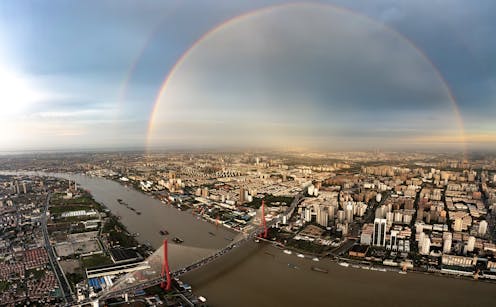Can rainbows form in a circle? Fun facts on the physics of rainbows
- Written by Partha Chowdhury, Professor of Physics, UMass Lowell

To see the full circle, however, you will have to be in an airplane, literally above the clouds. Or you could create your own rainbow. I am a physicist[4], and I’ll explain how to do that in a minute.
How a rainbow forms
Rainbows form[5] when sunlight from behind you hits millions of tiny round water droplets in front of you and bounces back to your eyes.
As a sunbeam hits a droplet at an angle, it bends into the water and separates out into a spectrum of colors. Scientists call the bending of light “refracting[6].” The colors separate because each “color” of light travels with a different speed[7] in water, or, for that matter, any transparent material that light can travel through, like glass in a prism.
When the colors hit the back wall of the water droplet, the angle is now too shallow for them to bend out into the air, so they reflect back into the water droplet and return to its entrance wall. From there, the colors can bend out again into air and reach your eye.
The United Kingdom’s Meteorology Office explains how light refracts, or bends, in a water droplet or a prism.As you look at these droplets, the different colors happen to bunch up at a slightly different angle, and each color forms the circular rim of a cone[8] with your eye at the tip of the cone. And, voila, you have your own personal rainbow.
The droplets that send the colors to your eye cannot send them to anyone else, so even though everyone near you sees the same rainbow at a distance, each person really sees their own slightly different rainbow. It’s all in the eye of the beholder.
For rainbows to form, the shape of the water droplets has to be very close to a sphere for all of them to bend and reflect the colors in harmony. This happens for very small droplets, such as a fine mist, or just after a rain shower when the air is just moist. As the droplets get larger, gravity distorts their shape and the rainbow vanishes.
A rainbow is not physically present where it appears to be, similar to your image in a mirror. So, I’m sorry to say that you can never actually reach your rainbow. And, alas, nobody can ever find that pot of gold.
But you can create your own rainbow[10].
How to create and see a circular rainbow
One experiment you can try in summer is to turn on a sprinkler hose using the “mist” setting. Remember to have the sun behind you. If you create a fine mist screen in front of you and look at your shadow, you might see a rainbow.
It is not difficult to see colors, but to see a full circle, you will need some patience and practice, just like scientists.
So next time you are on an airplane, grab the window seat. If you are flying a little above the cloud cover, keep a lookout for the small shadow of your plane on the clouds. That means the sun is behind you.
The clouds are tiny water droplets, so chances are you may see a small circle of color around the shadow of the airplane. This phenomenon is nicknamed “pilot’s glory[12],” because pilots who fly all the time and have a good view from the cockpit have a better chance of seeing it.
And if you really can’t wait to see what it looks like, there’s always the internet[15].
Hello, curious kids! Do you have a question you’d like an expert to answer? Ask an adult to send your question to CuriousKidsUS@theconversation.com[16]. Please tell us your name, age and the city where you live.
And since curiosity has no age limit – adults, let us know what you’re wondering, too. We won’t be able to answer every question, but we will do our best.
References
- ^ Curious Kids (theconversation.com)
- ^ curiouskidsus@theconversation.com (theconversation.com)
- ^ Wolfgang Kaehler/LightRocket via Getty Images (www.gettyimages.com)
- ^ a physicist (www.uml.edu)
- ^ Rainbows form (scijinks.gov)
- ^ call the bending of light “refracting (global.canon)
- ^ travels with a different speed (www.metoffice.gov.uk)
- ^ circular rim of a cone (atoptics.co.uk)
- ^ Mads Claus Rasmussen / Ritzau Scanpix / AFP (www.gettyimages.com)
- ^ create your own rainbow (www.youtube.com)
- ^ Gary Hershorn/Getty Images (www.gettyimages.com)
- ^ nicknamed “pilot’s glory (science.howstuffworks.com)
- ^ Matthew Straubmuller/Flickr (www.flickr.com)
- ^ CC BY (creativecommons.org)
- ^ always the internet (education.nationalgeographic.org)
- ^ CuriousKidsUS@theconversation.com (theconversation.com)
Authors: Partha Chowdhury, Professor of Physics, UMass Lowell

